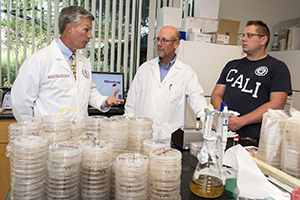October 1, 2015
SVSU partners with Healthway Compounding Pharmacy in research to improve lab safety
 Saginaw Valley State University students and faculty will spend the next year helping a local pharmacist create a cleaner environment for the medicine formulated at his Saginaw Township-based compounding pharmacy laboratory.
Saginaw Valley State University students and faculty will spend the next year helping a local pharmacist create a cleaner environment for the medicine formulated at his Saginaw Township-based compounding pharmacy laboratory.
The community partnership was formed when pharmacist Michael Collins asked James L. McEvoy, SVSU assistant professor of biology, to examine and identify the few bacteria found in the formulation lab at Collins' Healthway Compounding Pharmacy. The results will help Collins create an even more sanitary environment for producing customized medicines.
“Healthway is locally owned and has been supported by the community for 30 years,” Collins said. “Doing business locally is important to me. The science departments at SVSU have an outstanding reputation.”
McEvoy recommended conducting the research using a microbial identification system known as Biolog. Collins agreed to purchase the equipment; he has loaned the Biolog system to SVSU with the intent of donating the system to the university once the microbial identification research concludes next year.
“It's a win-win situation for everyone involved,” said McEvoy, a former United States Department of Agriculture food safety lab researcher.
“Michael wants to find ways to improve his pharmacy. SVSU is working with a community partner and receiving state-of-the-art equipment. And one of my main goals is to introduce students to research.”
Collins said he is excited about the partnership too.
“I want to give back to our community and this is a great opportunity for Healthway to do that,” he said. “The SVSU biology department and the students will have an opportunity to use a state-of-the-art microbial identification system and Healthway will be able to keep their business needs local.”
In 2007, Healthway Compounding Pharmacy earned the distinction of being the first compounding pharmacy in Michigan to become accredited by the Pharmacy Compounding Accreditation Board (PCAB). PCAB-accredited compounding pharmacies must undergo inspections and meet strict standards for quality control and quality improvement. The pharmacy is committed to providing high quality, safe medications to patients, thus they conduct periodic environmental testing of the lab.
SVSU's research will involve testing microbes captured from air samples collected during those environmental tests. In the university's laboratories, McEvoy and his students will isolate pure cultures of the microbes found in those samples and them run them through the Biolog metabolic fingerprinting system to identify.
The Biolog system includes equipment that analyzes the metabolic characteristics of the bacteria as well as computer software that cross-references those characteristics with a database of approximately 2,000 types of aerobic bacteria. The results indicate the most likely identities of the bacteria found.
Identifying the bacteria will help Collins understand how it entered the lab, and thus, how to prevent similar bacteria from entering in the future. McEvoy said a previously identified bacterium is typically found on human eyebrows, suggesting a pharmacy staff member scratching their eyebrow may have been the source of the microscopic intruder.
McEvoy expects to identify about 20 bacteria within the year.
Once the Healthway Compounding Pharmacy research is finished, McEvoy said he expects SVSU will use the Biolog system for teaching and faculty research while also offering research services to Healthway Compounding Pharmacy and other companies.
In 2015, SVSU received the Community Engagement classification from the Carnegie Foundation for the Advancement of Teaching, a distinction achieved by only 7 percent of U.S. colleges and universities. For more on SVSU's community engagement, visit svsu.edu/communityengagement/.
